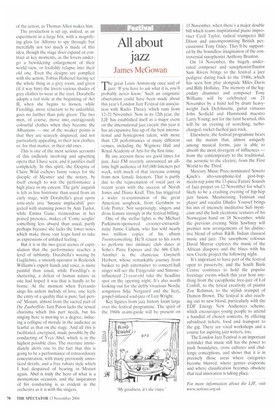All about jazz
James McGowan
e great Louis Armstrong once said of jazz: 'If you have to ask what it is, you'll probably never know.' Such an enigmatic observation could have been made about this year's London Jazz Festival (in association with Radio Three), which runs from 12-21 November. Now in its 12th year, the LJF has established itself as a major event on the international jazz circuit; this year it has an expansive line-up of the best international and homegrown talent, with more than 120 performances at many different venues, including the Wigmore Hall and Royal Academy of Arts for the first time.
By any account these are good times for jazz. Jazz FM recently announced an alltime high audience of 545,000 listeners per week, with much of that increase coming from new female listeners. That is partly due to the rejuvenation of vocal jazz in recent years with the success of Norah Jones and Diana Kra11. This has triggered a wider re-examination of the great American songbook, from Gershwin to Cole Porter. Not surprisingly, singers and divas feature strongly in the festival billing.
One of the stellar lights is the Michael Parkinson-sponsored crooner-extraordinaire Jamie Cullum, who has sold nearly two million copies of his album Twentysomething. He'll return to his roots to perform two intimate club dates at Soho's Pizza Express and the 606 Club. Another is the chanteuse Gwyneth Herbert, whose remarkable journey from busker to pub entertainer to concert-hall singer will see the Fitzgeraldand Simoneinfluenced 21-year-old take the headline spot on the opening night. It's also worth looking out for the deftly vivacious Nordic songstress Silje Nergaard and the fiery, gospel-infused soul-jazz of Lizz Wright.
Key figures from jazz history loom large over the festival programme. The spirit of the 1960s avant-garde will be present on 15 November, when there's a major double bill which teams inspirational piano improviser Cecil Taylor, radical trumpeter Bill Dixon and uncompromising British percussionist Tony Oxley. They'll be supported by the boundless imagination of the controversial saxophonist Anthony Braxton.
On 14 November, the hugely underrated composer and saxophonist/flautist Sam Rivers brings to the festival a jazz pedigree dating back to the 1940s, which has seen him play alongside Miles Davis and Billy Holliday. The memory of the legendary drummer and composer Tony Williams will be celebrated on 21 November by a band led by drum heavyweight Jack DeJohnette, guitar virtuoso John Scofield and Hammond maestro Larry Young; not for the faint hearted, this will be an evening of scorching, turbocharged, rocket-fuelled jazz-rock.
Elsewhere, the festival programme bears out the maxim that, almost uniquely among musical forms, jazz is able to absorb the most divergent of influences — from the contemporary to the traditional, the acoustic to the electric, from the First World to the Third.
Mercury Music Prize-nominated Soweto Kinch's alto-saxophone-led post-bopmeets-rap joins the 13-piece Future Sounds of Jazz project on 12 November for what's likely to be a crashing evening of hip-hop jazz fusion. Mesmerising Tunisian oud player and vocalist Dhafer Youssef brings his mix of intensely meditative Sufi mysticism and the lush electronic textures of his Norwegian band on 18 November, while the previous evening Nitin Sawhney will premier new arrangements of his distinctive blend of urban R&B, Indian classical music and jazz. The saxophone colossus David Murray explores the music of the African diaspora and the blues with his new Creole project the following night.
It's important to have part of the festival open to passers-by, and the South Bank Centre continues to hold the popular freestage events which this year host anything from the cacophonic free-jazz of Lol Coxhill, to the lyrical creativity of pianist Zoe Rahman, to the stylish trumpet of Damon Brown. The festival is also reaching out to new blood, particularly with the EDF Energy New Audiences scheme, which encourages young people to attend a handful of chosen concerts, by offering subsidised tickets, food and transport to the gig. There are vocal workshops and a course for aspiring jazz writers, too.
The London Jazz Festival is an important reminder that music still has the power to push boundaries, cross cultures and challenge conceptions, and shows that it is in precisely those areas where categories become blurred, where genres evaporate and where classification becomes obsolete that real innovation is taking place.
For more information about the LJF, visit www.serious.org.uk


























































































 Previous page
Previous page